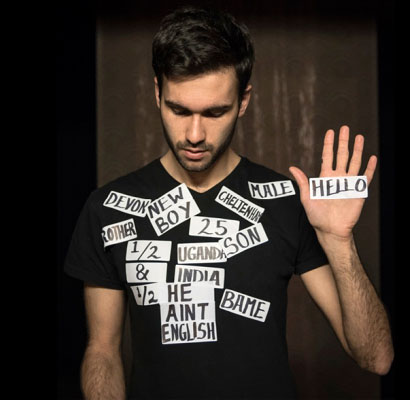
Joe Sellman-Leava is from a background we now like to call ‘mixed heritage’. His dad changed the family name from Patel using his English wife’s and a family branch name to produce something vaguely upper-middle class British. The change worked in that previously elusive job interviews finally came his way. This is a ploy with a venerable history, with plenty of immigrant Jews and Europeans from diverse countries having made a simple change to their name in order to outwit petty prejudice and fit in. In most cases it works albeit needing a generation to properly click. However what remains depressing is the mindless chauvinism and barely masked racism, which still clings like phlegm to the sanitary ware, refusing to be washed away down the toilet of history. Mr Sellman-Leava has in mind the corrosive nature of the tiny cuts, malicious or simply thoughtless, which flow from the labels we apply to ourselves and to others. He tells us of an early attempt to get a date on Tinder from a girl who, despite his clear credentials as an Englishman, was determined to label him as Indian and therefore ‘other’. A relationship he was clearly better off not developing.
Quite why the girl in question pursued her particular line of enquiry is something of a mystery since nothing about the lad in question would make it appear relevant. Indeed such is his evident affability that when he asked for an audience member to come onto the stage to act out the exchange a couple of hands immediately shot up, which is a rare occurrence with audiences under the age of about eight. He employs a technique used by a number of stand-up comics, which involves making a statement then pausing, smiling, to allow the ironies to wash over the audience. His mother doesn’t like curry, being one.
Which brings me to the question of what kind of performance this is. Too agreeable to be a polemic, the overall impression is of a rather slick and entertaining TED talk, but without any resounding ‘aha’. I’m guessing the audience was pretty much onside with much of what was said which was mostly ‘telling’ rather than ‘showing’ and to that extent was lacking in any emotional punch. However, by making the (labelling) connection with current events in the Mediterranean it does nobody any harm to be reminded that our moral and therefore practical responses to situations is closely determined by the labels we have assigned to individuals and groups, labels which for all we know are totally misapplied and inappropriate. ★★★☆☆ Graham Wyles reviewed at the Ustinov, Bath 8th January 2016

